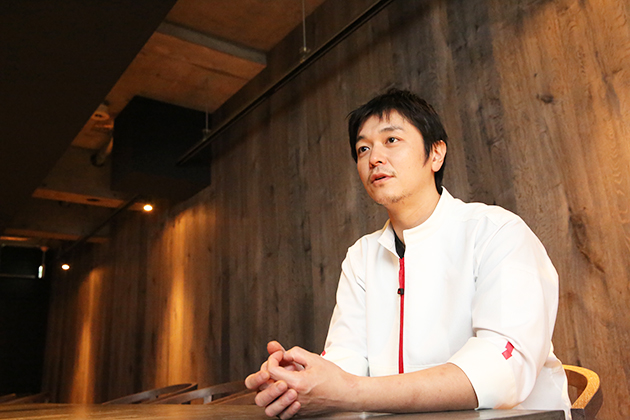
Interview: Mr. Hiroyasu Kawate
"Florilege" is a prominent French restaurant in Tokyo. Since its opening in 2009, it has been well-known as one of the few restaurants that is fully-occupied on a regular basis and is difficult to make reservations. Constantly taking in new ingredients and cooking method, Florilege finally opened its doors with a new concept after moving to its present location in March, 2015. Our first interview is with Chef Hiroyasu Kawate. We will ask him about his childhood, how he became a chef and his goals since opening the restaurant at this new location.
JAPANTWO(JP2):To start off, tell us about how you got interested in cooking.
Chef Hiroyasu Kawate (Mr. Kawate):I grew up in an environment where my family members as well as many of my relatives were cooks. It's not that I got interested in cooking, but cooking has always been part of my life. My parents had a western-style restaurant. Although they didn't really teach me much about cooking, the kitchen was the place where we all mingled.
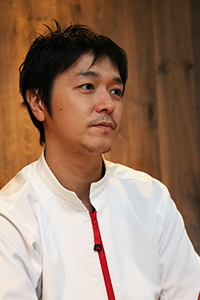
JP2:As you were saying cooking has always been part of your life, what made you decide to make it a career? And why did you choose French cuisine?
Mr. Kawate:I felt that I only had one choice: to become a chef. When I was in kindergarten, I thought of being either a chef or Anpan Man*. I didn't think much beyond that. For that reason, I never got interested in other careers and I won't quit being a chef in the future either.
However, choosing French cuisine was very important and a difficult decision to make. I made my decision when I was in high school. My father did western cuisine, my brother cooked Chinese, and my cousin was a Sushi chef, so I began to think, "what kind of cuisine suits me?" At that time, I was job-shadowing at an actual restaurant and French cuisine really drew me in. Japanese and Chinese cuisines were both great, but in French I encountered flavors that went beyond my imagination. So I thought I could spend all of my life exploring this cuisine, and this became the decisive factor. Since then, I just stuck with French cuisine.
JP2:What kind of experience did you have when you just started off as a cook?
Mr. Kawate:Starting off as a cook, we learned the basics one by one, repeating the rudimentary tasks day after day, like piling up the grains of dust little by little. Normally, the sharp ones get a jump-start in other industries, but there are no jump-starts for chefs. There is no other way than working your way up, step by step. This work ethic remains the same, even for me right now. If someone asks me, "Could you tell me about your French cuisine?" obviously, I will be give a definite response. But, if someone asks me, "What is French cuisine?" I won't be able to give him a good answer, since I think I'm still not qualified to spell out such profound cuisine. To this day, I still remind myself that I'm an apprentice in training.
JP2:Now, could you tell us your personal views on French cuisine?
Mr. Kawate:My French is a progressive French. I stick with French cuisine made in Japan. That is, French cuisine that can only be made in Japan, in Tokyo. If I were to narrow it down, a French cuisine only made here in Jingumae and only by me.
JP2:When did you began thinking about opening your own restaurant?
Mr. Kawate:I thought about that before I became a cook. To be exact, it was when I was around 23 and began working as a Sous chef. Back then, I declared to myself that I'll open my restaurant in my 20s. It was not a special thing but an obvious decision for me to take. It's kind of like, I have been preparing everything for it.
JP2:Why have you decided to only use domestic produce for your ingredients?
Mr. Kawate:Why not? What is the reason for using imported ingredients? Being in Japan, I started questioning the reason for importing things like Foie gras. There was an urge to create French cuisine that utilizes Japanese produce, without depending on Foie gras or caviar. I truly believe that Japanese produce goes well with Japanese customers. That's why I stick with domestic produce for my cuisine.
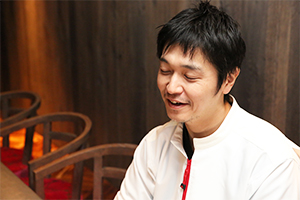
JP2:What is the reason behind creating a cuisine that is not completely bound by the traditional idea of French cuisine?
Mr. Kawate:Like the way the concept of what we commonly call "French cuisine" solidified, I wondered why can't there be a French cuisine of my own. There are no boundaries to cooking and everyone is free to choose how they cook. I believe concepts are just bunch of prejudice. It's about who agrees with my idea or not.
JP2:Does your flexibility come from your personality? Or does it come from your experience?
Mr. Kawate:I am the one who changed the most. 5 years ago, I was concerned about how I can cook the ingredients to please my customers. Right now, my concern is about what they experience. Furthermore, what I can offer them. I think about what kind of impression I want my customers to remember, and how this experience affects their future actions. I want them to "experience" dining. From "dining = delight" my goal is to provide "dining = happiness." Obviously "dining = delight = happiness". My conceptualization has changed dramatically.
JP2:What's the reason behind changing the kitchen into an open concept for this newly renovated restaurant?
Mr. Kawate:Originally, I didn't have this open concept arrangement in mind. But, it materialized in this way before the renovation, during the planning stage when we were integrating my ideas. In this restaurant, we offer cuisines based on 13 different concepts. In addition, we're planning to offer all of our alcohols by pairing them with the dishes. By doing so, we will end up short-handed with the number of servers. Then, I realized that the cooks can bring the dishes out. And I thought I was the suitable person for doing it; as the person who has interacted with the producers of the ingredients, there are things which could only be communicated by me. As a result, the open concept was the most appropriate style.
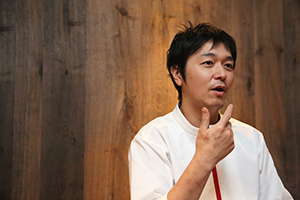
JP2:What is your expectation from the team of chefs and garcons?
Mr. Kawate:I expect many things from them, but I'd like them to be a team that can fully offer our customers the cuisine that draws its tastes from the cultivation stage of the produce. That's why I want them to be proactive and ask me questions about the cuisine. I don't want them to be hesitant because I'm the chef, but I want them to inquire many things because I'm the chef. Unfortunately, no one has really tried this format, so it'll be a lifetime work trying to assemble a team like that.
JP2:Are there any particular thing you would like your customers to experience through your cuisine?
Mr. Kawate:Definitely. I want them to relish the 13 concepts, but I don't want to be pushy. The things they feel depend on the their personal experience and perspectives on life, so my approach is to present them the questions.
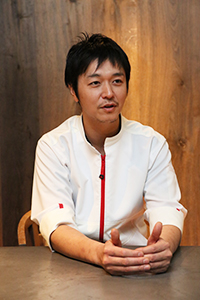
JP2:Please tell us your views on how an ideal chef and ideal person should be.
Mr. Kawate:Regarding the skills, I have always respected chefs in Japan and chefs around the world. However, I have never pondered on how an ideal chef should be. My view is that you need to work step by step on the things in front of you to get results. So, doing your best in your present work, sums it up.
* "Anpan Man" is a Japanese cartoon character popular amongst children.
Florilege
